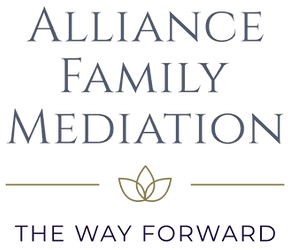Alliance Family Mediation is committed to providing a high-quality service. In order to do this, we need you to give us any comments about our service, and to tell us when we get things wrong. We want to help you resolve any complaints you may have as quickly as possible.
This complaints procedure allows a client, former client or a qualifying third party (see below) to make a complaint that relates to breaches of the FMC’s Codes of Practice or Standards Framework that occurred within the last three months. For avoidance of doubt, complaints that relate to the way a mediation was conducted as a whole, the date the three months runs from is the last mediation session. Complaints that appear to be vexatious or of a purely personal nature do not have to be investigated
A qualifying third party who can make a complaint against a mediator is:
• A prospective client who has been directly affected by a mediator’s professional behaviour
• A person who has been invited to participate in a mediation process, for example another professional who attends a mediation
• Where a third party is involved in a complaint, confidential information will not be disclosed.
Under FMC/FMSB guidelines:
• Complaints against a mediator contacting a potential participant, do not need to be investigated.
• Complaints against a mediator who has not invited a potential participant and has issued a court form to the other participant, do not need to be investigated.
How to complain
You can make a complaint by telephone, letter or email
You can send an email to:
[email protected]
You can post a letter to:
Alliance Family Mediation
61 Bridge Street
Kington
HR5 3DJ
You can telephone:
01227 219241
We have a 2-stage complaints procedure. At each stage it will help us to resolve your complaint quickly if you can give us as much clear detail as possible, including any documents and correspondence and stating that you are making a complaint in line with our procedure.
Our standards for handling complaints
- we treat all complaints seriously, whether they are made by letter or by email
- you will be treated with courtesy and fairness at all times – we would hope, too, that you will be courteous and fair in your dealings with our staff at all times
- we will treat your complaint in confidence
- we will deal with your complaint promptly – we will acknowledge receipt of a written complaint within 7 working days, and we will send you a full reply within 28 working days of receipt
- if we cannot send a full reply within 28 working days of receipt, we will tell you the reason why and let you know when we will be able to reply in full.
Confidentiality
All complaints received will be dealt with confidentially and informing only those who need to know. Also, in accordance with the requirements of the Data Protection Act 1998.
The stages of the complaint’s procedure
Stage one
This is the first opportunity for the company to resolve a complainant’s dissatisfaction, and the majority of complaints will be resolved at this stage. In the first instance, we will try to get your complaint resolved by an appropriate person and to take appropriate action. If the complaint relates to a specific person, they should be informed and given a fair opportunity to respond. Complaints should be acknowledged by the person handling the complaint within 7 days. The acknowledgement should say who is dealing with the complaint. A copy of this complaint procedure should be attached.
Ideally, complainants should receive a definitive reply within 28 working days. If this is not possible because for example, an investigation has not been fully completed, a progress report should be sent with an indication of when a full reply will be given. Whether the complaint is justified or not, the reply to the complainant should describe the action taken to investigate the complaint, the conclusions from the investigation, and any action taken as a result of the complaint.
If the complaint is about a mediator his or her PPC (Professional Practise Consultant) will be informed of the complaint.
Stage two
If you are dissatisfied with this response, you may request a review by the owner of the business, Julia Butler. Your request for owner level review should be acknowledged within a week of receiving it. Julia Butler may investigate the facts of the case herself or delegate a suitably senior person to do so. This may involve reviewing the paperwork of the case and speaking with the person who dealt with the complaint at Stage One. If the complaint relates to a specific person, they should be informed and given a further opportunity to respond. The person who dealt with the original complaint at Stage One should be kept informed of what is happening.
Ideally, complainants should receive a definitive reply within 28 working days. If this is not possible because, for example, an investigation has not been fully completed, a progress report should be sent with an indication of when a full reply will be given. Whether the complaint is upheld or not, the reply to the complainant should describe the action taken to investigate the complaint, the conclusions from the investigation, and any action taken as a result of the complaint. The decision taken at this stage is final, unless the owner decides it is appropriate to seek external assistance with resolution.
Timescales for handling a complaint
Stage 1 – maximum 28 working days
– acknowledgement within 7 working days
– full response within 28 working days
Stage 2 – maximum 28 working days
– acknowledgement within 7 working days
– full response within 28 working days
Action we may consider
The action we take to put matters right (i.e. redress) in response to a complaint, can include any combination of the remedies set out in the list below. The general principle we follow is that a complainant should, so far as possible, be put in the position he or she would have been in, had things not gone wrong.
The remedy chosen needs to be proportionate and appropriate to the failure in service and consider what people are looking for when they complain. An apology is normally appropriate, but other action may also be necessary:
- a sincere and meaningful apology (explaining what happened and or what went wrong) – an apology is not an acceptance of liability under Section 2 of the Compensation Act 2006
- putting things right (for example change of procedures to prevent future difficulties of a similar kind, either for the complainant or others)
- training or supervising staff
- financial compensation
Mediation of the complaint
Where both the mediator and complainant agree, mediation can be used to resolve the complaint.
Complaint to family mediation standards board (FMSB)
If the complainant is not satisfied by the response given to their complaint, they can ask the FMSB (see separate procedure) to consider the complaint if certain criteria are met. We can provide information about this. Please be aware that escalating a complaint to the FMA does not prejudice a client’s right to seek civil remedy.

Helping families reach amicable agreements in a less stressful and less expensive way. You get to decide the outcome, instead of the courts deciding for you. I am here to guide you by sharing legal knowledge and offering understanding & empathy to your situation.

What is Mediation?
Meet Julia Love
Privacy Policy



